Raise funds for Winter Clothing and Blankets
There are many ways you can fundraise, whether it’s a bake sale, a marathon, or a party!
This website will offer limited functionality in this browser. We only support the recent versions of major browsers like Chrome, Firefox, Safari, and Edge.
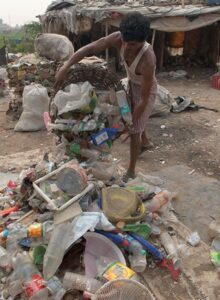
Rag pickers collect garbage and sell it for recycling.
Full of hope, brothers Sagen and Raam had left their families in their home village, seeking work in a factory or other profitable company. Inquiry after inquiry siphoned their hope of obtaining gainful employment. What were they to do? How could they provide for their families without work?
The two later learned of a job that required no employer—rag picking. Pick through garbage and find items to sell for recycling? Knock on doors pleading for other people’s cast-offs? Is this what they had left their homes to achieve?
Perhaps the brothers lowered their heads in shame as they considered the prospect, but they were desperate. Feed themselves and their families, they must. If that required digging through trash, so they must.
“In fact, this work was very dishonorable in the beginning of our days,” said Sagen, “but no work was shameful for us by thinking about our starving family members.”
Raam’s family didn’t even know what kind of work he was doing. They were just grateful for the provision.
“In fact, this work was very dishonorable in the beginning of our days . . . but no work was shameful for us by thinking about our starving family members”.
So, the brothers set off to work. They probed the streets, gathering discarded cans, plastic items, cardboard and paper. They knocked on doors—ignoring the distaste of many residents—asking for broken plastic items, old books, newspapers and the like.
At night, they returned to their tent in the slum, living like the 1 billion people worldwide who, according to UN Habitat, reside in informal settlements of “perpetual poverty, deprivation and socio-spatial exclusion.”
Without proper lodging or warm clothing, the brothers shivered during the winter. A natural defense mechanism against the cold, these shivers could grow intense and uncomfortable, making it difficult to sleep.
Sagen had one thin blanket. It didn’t keep him and his brother warm, but somehow they managed, though the constant exposure to cold made them more vulnerable to physical ailments as it suppressed their immune systems and increased their blood pressure.
They really needed a new, thick blanket, but how were they to afford one? They barely earned enough to keep themselves and their families fed.
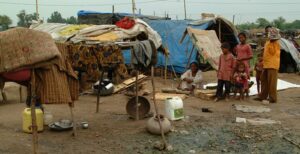
Balin lived in a slum similar to the one pictured. His tent did little to keep out the cold.
Balin, father of three, had also come to the area in search of work. The only work he found was rag picking. For nine years, he had spent his days digging through trash in hopes of finding treasure. For nine years, he had traversed the city on his bicycle, collecting anything that might bring in a little cash. Some days he did well. Some days he barely made enough to eat a single meal. Every night he dragged himself back to his tent in the slum to get some rest before rising the next day and resuming his tiring hunt for survival, his hunt for a better life for his children.
In Balin’s home village, his children studied in a government school. Their future drove him to continue his search, to keep working no matter how difficult or dirty or draining.
“I don’t want my children to suffer like me, working in [a] dirty place,” Balin said. “If they get an education, it will be useful for them to join in some respectable occupation.”
So, Balin pressed on. When winter brought colder temperatures, he crawled into his temporary shelter of fabric and tarp and made do. Without a proper blanket, Balin struggled to get decent sleep at night. The prolonged exposure to the cold likely drained him both physically and mentally.
Still, he arose the next morning, shook off the weariness and set off in his quest. It was what he must endure for his children to have any hope of a better future.
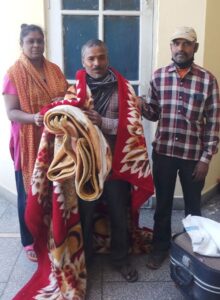
Brothers Sagen and Raam were extremely grateful to receive warm blankets.
Sagen, Raam and Balin shared a common plight. They shivered and struggled for the sake of their families. According to the UN, “One of the most vulnerable aspects of slum life is job and livelihood opportunities.”
The informal jobs available to these three men paid pitifully, offering little more than survival.
Barely able to put food on the table, there was no money for them to afford a sufficient blanket, and their makeshift housing did little to ward off the cold.
Fortunately, they were soon to receive a shared solution.
GFA pastor Pieter and his wife, Chastity, were serving in the same area where these three men had migrated to work. These missionaries were there to serve the community and share Christ’s love in whatever ways they could.
Chastity had seen these men in the area collecting recyclables. She knew the destitution many rag pickers suffered. After a tiring day of collecting refuse, they would wearily return to dilapidated, temporary housing in unsanitary conditions.
It was difficult work that exposed them to disease and various hazards yet, on average, garnered them less than $1 a day.
As she watched the rag pickers pass by her door, Chastity pondered how she and Pastor Pieter could help them. She offered recyclable items to them when she could, but she wanted to do more.
“From today, I [will] be able to sleep well at night by keeping my body warm during this winter. Thank you for having a concern about me”
She struck up a conversation with the men, first with the brothers and later with Balin. Listening with compassion, she learned their stories and of their need for warmth. There was her answer: She and Pastor Pieter could provide blankets for the men. The blankets would silence their shivers and help them rest well at night, which would help them provide for their families during the day.
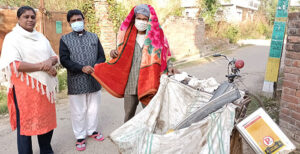
Balin (pictured right) stands next to his bicycle and rags as he receives a much-needed blanket from Pastor Pieter and Chastity.
In shock, Sagen and Raam dropped the rags they held to receive the thick blankets. They couldn’t believe they were to receive such timely and caring gifts. Joy and gratitude surged through the men’s hearts.
“This year, I was really in need of a blanket,” Sagen said. “I was worrying about how to buy one. Today, I am blessed by receiving this blanket. May God bless you.”
Likewise, Balin never anticipated that he would get a blanket freely at his very time of need. A smile lit across his face in response to the gift. With hands pressed together, he exclaimed, “Thank you so much for your help. I have heard that church people are kindhearted, which I could see [with] my eyes today. From today, I [will] be able to sleep well at night by keeping my body warm during this winter. Thank you for having a concern about me.”
After encouraging the man and praying for him, Pastor Pieter and Chastity invited him to church to learn more about Christ’s love. Perhaps they also offered a silent prayer that Balin would experience Christ’s love every time he enjoyed the warmth of the blanket given in Jesus’ name.
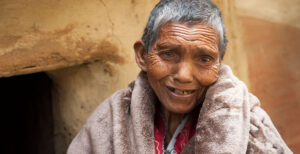
Impoverished people often can’t afford to purchase a blanket and struggle in the cold. You can help provide warmth in Jesus’ name.
Like Sagen, Raam and Balin, there are many impoverished people in need of blankets to keep them warm. They may be struggling just to survive and feed their families, with no extra funds to purchase such a simple luxury. Often, their housing is insufficient to keep out winter’s cold air. They may shiver through the night, hoping to get enough rest to perform the next day’s work and provide for their families, hoping the exposure to the cold doesn’t make them sick.
You can offer warmth to someone in need in Jesus’ name. With the simple gift of a blanket, you can help wrap Christ’s love around these precious individuals and help them rest well. As a tangible reminder of Christ’s love, this blanket can bring warmth to body and soul and impact lives.
There are many ways you can fundraise, whether it’s a bake sale, a marathon, or a party!